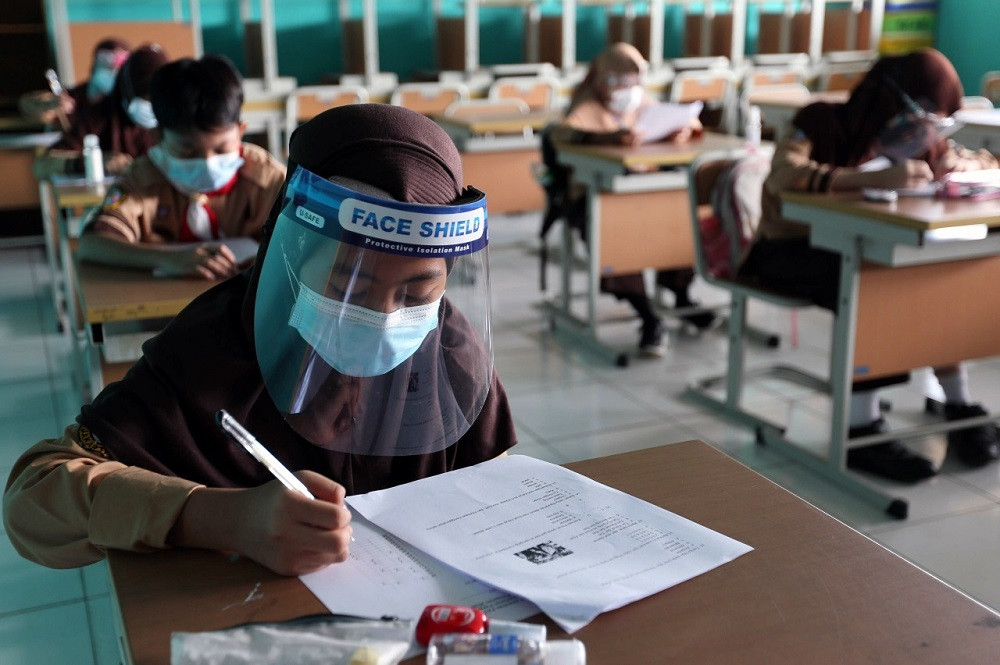Popular Reads
Top Results
Can't find what you're looking for?
View all search resultsPopular Reads
Top Results
Can't find what you're looking for?
View all search resultsTeachers call for technological, pay equity amid pandemic strain
Change text size
Gift Premium Articles
to Anyone
A
s the country celebrates National Teachers’ Day on Thursday, educators are calling on the government to pay more attention to the mounting issues that the profession faces, many of which have been exacerbated by the pandemic, from a lack of online education support to welfare issues.
A number of teachers have said they hope the government will succeed in preventing a third COVID-19 wave resulting from the upcoming year-end holidays, as they dread the possibility of returning to what they say are insufficiently supported online classes. In-person education resumed in most parts of the country in late August.
Syainal, a vocational teacher from Berau regency, East Kalimantan, described online classes as by far the most problematic aspect of teaching over the past two years.
"Schools in more developed areas might have it easier. But in Berau, we barely have internet connection," Syainal said on Tuesday.
"And because we are a vocational school, our students need practical in-person learning. So if we go back to online learning, it will be almost impossible for them to practice the skills."
For most of the pandemic, Syainal’s school relied on home visits from teachers to give students lessons and assignments. However, not all the students were accessible. Some lived in villages located seven hours away from the school.
Syainal, like many other teachers, had to limit the scope of his lesson plans for the past year of online learning to keep classes functioning and pupils in school. But this, he said, had caused learning loss among many of his students, which became obvious when they returned to in-person classes in late August.
[RA::Prolonged school closure puts students’ future earnings at risk: WB
study::/news/2021/09/24/prolonged-school-closure-puts-
students-future-earnings-at-risk-wb-study.html]
On Simeulue Island, Aceh, teacher Ahmad Sohabudin faced similar problems.
Having taught in Jakarta, Ahmad said that beyond the lack of technological infrastructure in Simeulue, teachers at his school did not have the digital competence to teach remotely.
"Teaching is not just transferring knowledge. Teachers also need to teach values, and they are struggling to do so through online learning. I feel pity for them. People in Jakarta take their [digital] knowledge for granted, while teachers here are still struggling," he said.
Education, Culture, Research and Technology Minister Nadiem Makarim attempted to limit learning loss during the pandemic with a swift return to in-person education starting in late August, despite continuing health concerns.
Ahmad said he hoped the government would pay more attention to schools and teachers in less developed regions, adding that it would be impossible for the government to achieve its human development targets if it did not close the education infrastructure gap.
[RA::Nadiem’s push for classroom learning meets resistance as health concerns
remain::/news/2021/08/25/governments-push-for-classroom-
learning-meets-resistance-as-health-concerns-remain.html]
Teachers, especially those with more precarious, quasi-official working arrangements, have been disappointed by Nadiem’s failure to keep a promise he made last year to admit 1 million civil servant teachers this year, a professional category that allows for better pay, health benefits and more job security.
[RA::Fate of nonformal teachers in jeopardy, experts
say::/paper/2021/06/20/fate-of-nonformal-teachers-in-jeopardy-
experts-say.html]
That quota has since been cut in half, and only 173,000 teachers have been recruited so far, leaving the fate of other such teachers, who have long suffered from low wages, a lack of career development and the inability to access welfare benefits, in jeopardy.
“What Nadiem said [about recruiting 1 million teachers] was just an empty promise. We have a shortage of teachers, and therefore, the government needs to recruit 1.3 million more to reduce the shortage,” said Satriwan Salim of the Education and Teachers Association (P2G).










